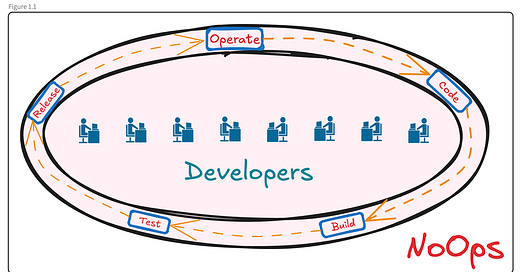NoOps: The Future of IT Operations or Just a Cloud-Driven Dream?
Exploring the Rise of NoOps, Its Benefits, Challenges, and Whether It Can Truly Replace DevOps
The world of software development and IT operations is in a constant state of evolution. Over the past decade, DevOps has become the gold standard for integrating development and operations, breaking down silos, and fostering automation, collaboration, and continuous delivery. However, as cloud platforms and AI-driven automation mature, a new paradigm is emerging—NoOps.
NoOps (No Operations) aims to eliminate the need for traditional operations teams by fully automating infrastructure management, deployments, and maintenance tasks. This raises a critical question: is NoOps the next step in the evolution of IT, or is it an unrealistic utopia?
What is NoOps?
NoOps (No Operations) is a concept that envisions complete automation of IT operations, where developers can focus solely on writing code, and the infrastructure automatically manages itself. NoOps is made possible through:
Serverless Computing— No need to manage underlying infrastructure.
Example: AWS Lambda, Azure Functions, Google Cloud Functions
AI-Driven Automation— Intelligent systems that handle scaling, monitoring, and issue resolution.
Example: Datadog, Donatrice, New Relic
Self-Healing Infrastructure — Systems that detect and fix issues automatically.
Example: Terraform, Pulumi
Managed Servers & SaaS Platforms— Relying on third-party cloud providers to handle all operational tasks.
Example: Google App Engine, Heroku, Firebase.
NoOps suggests that developers no longer need a dedicated operations team, as cloud platforms like AWS, Google Cloud, and Azure handle everything, from provisioning to security and scaling.
Advantages of NoOps
Developers focus on coding – No need to worry about infrastructure management.
Faster time to market – Rapid deployment using serverless and managed services.
Lower operational overhead – No need to hire a dedicated ops team.
Self-healing and auto-scaling – Systems fix themselves without human intervention.
Challenges of NoOps
Vendor lock-in – NoOps relies heavily on cloud providers like AWS, Azure, or Google Cloud.
Less control over infrastructure – If something goes wrong, fixing it might not be in your hands.
Not ideal for complex enterprise systems – Large enterprises with strict security and compliance needs may find NoOps too restrictive and will likely stick to DevOps for its flexibility, security, and ability to handle complex architectures.
Hidden costs – While NoOps reduces labor costs, serverless and managed services can become expensive at scale.
As AI-driven infrastructure advances, NoOps will continue to grow, but DevOps will remain relevant—especially in industries requiring security, compliance, and deep infrastructure customization. Rather than choosing one over the other, many organizations are adopting a mix of both, leveraging NoOps automation for routine tasks while keeping DevOps practices for more complex operations.





